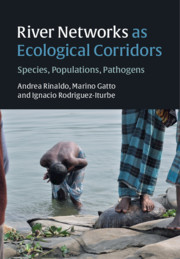2 - Species
Published online by Cambridge University Press: 01 October 2020
Summary
The chapter is not a complete review of the subject but rather contains a specific choice of topics relevant to the general concepts of biodiversity in river networks. It first explores the fish diversity of the Mississippi-Missouri river system via a hierarchical metacommunity model that includes river hydrology and habitat suitability. Illustrated is the role of the frequency distribution of shear stresses in determining the spatially explicit probability distribution functions of benthic invertebrate habitat suitability. The viewpoint is then broadened by addressing general metapopulation persistence in river networks; this is achieved by analyzing stage-structured populations that exploit different dispersal pathways, both alongstream and overland. Examples are given with reference to amphibians. Gradients of biodiversity in fluvial landscapes, as determined by changes in elevation, is the next topic. The characteristic features of hump-shaped patterns of species richness along elevational gradients are derived, using both idealized (but realistic) fluvial landscapes and real landscapes of the Swiss Alps. The approach allows also the outline of possible consequences of climate change.
Keywords
- Type
- Chapter
- Information
- River Networks as Ecological CorridorsSpecies, Populations, Pathogens, pp. 47 - 113Publisher: Cambridge University PressPrint publication year: 2020

